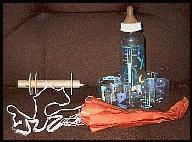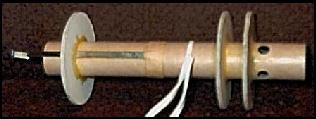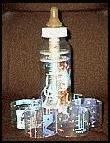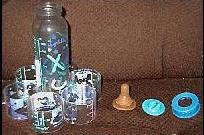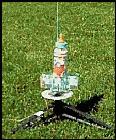| Manufacturer: | Scratch |
| by Dwayne Surdu-Miller
Boddomuk uses a standard baby-bottle nipple, cap, and ring to form a nose cone. When floating down by parachute, the nipple is pointing downward, which supports an "oral recovery option" for the young-at-heart. At first, this design was going to be a long-distance milk deployment system. Well, sort of. You can load up the nipple, carefully assemble it onto the body with the cap and ring, and there you have it... a small, nipple-sized payload compartment that can be used to transport fluids, maybe as further encouragement for the "oral recovery option". The motor/recovery pod can easily be built for various engine sizes. So far, I've only checked stability with heavier 18 mm motors. The pod can conceivably be built to accommodate up to F and shorter G motors. For higher thrust motors, however, more durable adhesives must be used to attach the tube fins. Use your personal preferences for selecting the color of nipple retaining ring and for selecting the material (nylon or silicone), sensitivity (ultra, elite, or classic), and shape (standard, orthopedic, or wide) of the nipple. I fly with the standard nylon nipple with classic sensitivity and low flow. Personally, for rocket flights I tend to shy away from the ultra-sensitive, silicone, orthopedic nipples. Although they have an interesting transparent and asymmetric appearance, they are not nearly as sturdy as the nylon nipples. |
| |
| Specifications: length: 20.5cm (8") calibre: 53mm (2.087") motor mount: 18mm (reconfigurable) motorless weight: 95g (3.36 oz.) fins: six 53mm tube cluster fin cluster diameter: 159mm recovery: rear-deployed parachute recommended motors: |
Parts
List: 3 - round 8-ounce baby
bottles (I used Evenflo Classic nurser system) |
| Boddomuk Construction
Details: Boddomuk construction can be split into three phases: airframe construction, pod construction, and final assembly. NOTE: For the following instructions, 1.1 Cut the bottom 6 mm off of the three baby bottles. Use a band saw or a razor saw for this step. The bottles are too slippery, too tough, and too thick to do this safely with a hobby knife. 1.2 Select which bottle will be the body. Make six tube fins from the other two bottles by cutting the bottles into 37 mm lengths. Again, use a band saw or a razor saw. 1.3 Cement two tube fins together, side-by-side with the ends even. Set the assembly aside, resting on the sides of the tubes fins rather than on the ends. Wait for the cement to dry. Repeat with the two remaining pairs of tube fins. 1.4 Cement a pair of tube fins to the body bottle, extending 10 mm beyond the bottom cut edge of the body bottle. Cement another pair to the body bottle and to the mounted tube fin pair. Cement the final pair to the body bottle and to the mounted tube fin pairs. All tube fins must extend 10 mm beyond the bottom of the bottom of the body bottle. Wait until the cement is dry. 1.5 Wrap an adhesive label around the straw. Cement the label-wrapped straw to the body bottle, aligned with a triangular gap formed by two tube fins and the body bottle. This should provide enough clearance for easy insertion of a launch rod between two tube fins. 2.1 Cut centering rings from 1.5 mm thick paper board or 3/32" balsa wood. Each centering ring must have an inner diameter of 18.7 mm and an outer diameter of 52 mm. Sand the outside edge of the rings for a tight fit inside the body bottle. 2.2 Punch or cut four 1/4" diameter holes, evenly spaced around the BT-20 tube, centered 21 mm from one end of the tube. This end of the tube is referred-to as the "top" end in following steps. 2.3 Glue the 5 mm (1/4") thick balsa block into the "top" of the BT-20 tube so that it is flush with the "top" edge of the tube. What is meant by a "nose block" is a balsa cylinder whose diameter is the inner diameter of the BT-20 tube. It can be made by turning it on a mini-lathe or by cutting an 18 mm circle out of a 1/4" thick sheet of balsa wood. 2.4 Glue a motor block 60 mm (2 1/2") up the
"bottom" end of the BT-20 tube as follows: 2.5 Make a 3 mm (1/8") mark, 65 mm from the "bottom" end of the BT-20 tube. Cut a 5 mm (1/8") slit along this mark. Insert one end of a motor clip into this slit. 2.6 Secure the inserted end of the motor clip to the BT-20 tube by applying glue to one side of a 13 mm x 100 mm strip of kraft paper, then wrapping the strip over the inserted end of the motor clip. A weaker alternative would be to use a 13 mm x 100 mm strip of masking tape in place of the kraft paper. The main purpose of this strip is to ensure that no exhaust gases enter the parachute compartment, so masking tape should be fine. 2.7 Mount a centering ring 42 mm from the "top" end of the BT-20 tube. Secure the ring with a bead of yellow or white glue. 2.8 Mount a centering ring 28 mm from the "top" end of the BT-20 tube. Secure the ring with a bead of yellow or white glue. 2.9 Mount a centering ring 17 mm from the "bottom" end of the BT-20 tube. Secure the ring with a bead of yellow or white glue. This ring will squeeze the motor clip against the BT-20 tube. 3.1 Sand the centering rings of the pod for a snug fit into the body bottle of the airframe. 3.2 Assemble the parachute. 3.3 Tie the center of the 70 cm elastic shock cord to the middle of the pod's BT-20 tube, using a square (or "full") knot. 3.4 Tie one end of the shock cord to one end of a 23 cm length of twine (crochet, Kevlar®, or shroud line). 3.5 Tie the free end of the twine to one of the airframe's tube fins. 3.6 Tie the free end of the shock cord to the ring-end of the snap-swivel. 3.7 Tie the parachute to the snap-end of the snap-swivel.
|
| Flight Reports:
Session 1 Loaded with a B6-4, the Boddomuk's take-off was slow and majestic (especially for a baby bottle :). It reached apogee within easy viewing range, and showed us a beautiful pod and 'chute deployment, with no apparent tangles. Under a 40-cm 'chute, the Boddomuk's descent was moderately fast, landing on a hard-packed gravel walkway 20 metres northwest of the launch pad. For a recovery crew game that I have in mind for this design, a 45-cm 'chute would probably give an ideal descent rate. Anyhow, the Boddomuk was recovered with no damage. The body was internally coated with dust from the motor's deployment charge, but became perfectly clear again when cleaned out with a baby bottle brush and some soapy water. The topmost centering ring of the pod was stained a little where deployment exhaust gases exited the pod's tube. |
 |
 |

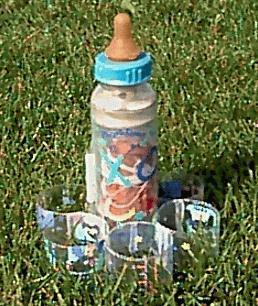 Boddomuk attempts to answer that age-old rocketeer question,
"now that baby's drinking from cups, can I do something cool with these
bottles?" This baby bottle frankenstein is a rugged, transparent-bodied
tube-fin rocket with a rear-ejecting motor/recovery pod, requiring no
flame-proof wadding whatsoever.
Boddomuk attempts to answer that age-old rocketeer question,
"now that baby's drinking from cups, can I do something cool with these
bottles?" This baby bottle frankenstein is a rugged, transparent-bodied
tube-fin rocket with a rear-ejecting motor/recovery pod, requiring no
flame-proof wadding whatsoever. 